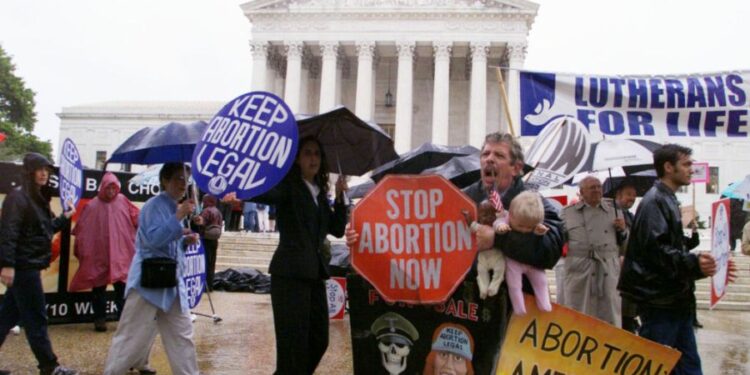
(NewsNation) — Nebraska voters headed to the polls will be shaping the state’s abortion policy as two contrasting ballot initiatives ask them to weigh in on the right to abortion access.
Nebraska is one of a record 10 states where abortion ballot measures will decide the future of abortion access following the overturning of Roe. v. Wade in 2022.
In mid-September, after hearing arguments in three lawsuits, the state supreme court decided to allow the competing measures on the ballot, unanimously stating that the two questions shared no more than a single connected legal subject.
Here’s a look at what Nebraska voters will be deciding in November:
Nebraska abortion initiatives
Ballot Initiative 434 would amend the state’s constitution to ban abortion after the first trimester except in cases of a medical emergency or if the pregnancy is the result of rape or incest. Doctors classify the first trimester as ending between 12 to 14 weeks of pregnancy.
The measure does not define what constitutes a medical emergency or indicate what would be required to confirm a pregnancy was a result of rape or incest. In many states, victims of rape or incest are required to provide proof of police involvement if they are seeking an abortion.
While the measure caps the length of time abortion can be made legal, it does not set a minimum, which means state lawmakers could institute narrower restrictions.
Ballot Initiative 439 would amend the state’s constitution to establish the right to an abortion until the point of fetal viability or later if necessary to protect the life or health of the pregnant person.
The initiative defines fetal viability as the point at which there is expected sustained survival of a fetus outside the womb without extraordinary medical interventions, in the professional judgment of a health care provider. In most cases, this is considered to be between 22 and 24 weeks of pregnancy.
This measure would overturn existing abortion restrictions and prevent lawmakers from instituting new ones. It could also put at risk other laws surrounding abortion, including parental notification requirements for minors seeking an abortion, the requirement a patient be given a chance to see an ultrasound before having an abortion and a 24-hour waiting period to obtain an abortion.
Abortion laws in Nebraska
Nebraska law currently limits abortion to 12 weeks of pregnancy. It does include exceptions for later abortions if the life of the pregnant person is in danger, if there are serious risks to the pregnant person’s health or if the pregnancy is the result of rape or incest.
The state also requires anyone under 18 have parental permission for an abortion and institutes counseling requirements, which include the option to view an ultrasound and the gestational age of the child. The counseling also includes information on crisis pregnancy centers and family planning services as well as information about the negative psychological impact of abortion, which reproductive rights advocates say is not backed by science.
The state also prohibits the use of telehealth for medication-induced abortions and the requirement that patients be provided with information on how to reverse the abortion pill. The American College of Obstetricians and Gynecologists says there is no scientific evidence that abortion pill reversals are possible.
Abortion at the ballot box
Nebraska is one of several states that will have abortion-related measures on the ballot in November. Since the Supreme Court overturned Roe v. Wade in 2022, a number of states have put the issue to voters.
Voters in California, Michigan and Vermont voted to enshrine abortion in state constitutions in 2022 and Ohio voters followed in 2023. Also in 2022, voters in Kansas and Kentucky rejected amendments that would prohibit courts from interpreting state constitutions as including a right to abortion, while voters in Louisiana approved one such measure in 2020 prior to Roe being overturned.
Public views on abortion
Polling shows broad support for abortion access across the U.S., with 63% of Americans believing it should be legal in all or most cases, while 36% say it should be illegal, according to Pew Research Center.
Republicans are more likely to say abortion should be illegal at 57% compared to 14% of Democrats. Among religious groups, 73% of white evangelical Protestants say abortions should be illegal, followed by 40% of Catholics, 33% of white non-evangelical Protestants, 26% of Black protestants and 13% of religiously unaffiliated Americans.
Voters in Nebraska are less polarized on the issue, with a slight majority for preserving abortion rights according to Pew. Fifty percent say abortion should be legal in all or most cases and 46% say it should be illegal in all or most cases.







